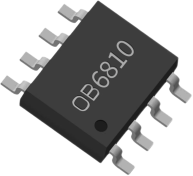In AC-DC power supplies, as the power supply increases, the conduction loss of the rectifier bridge diode becomes an important factor restricting system efficiency. In high-power power supply systems, in order to reduce the conduction loss of input rectifier circuits, improve system efficiency and thermal performance, power IC design manufacturer Anbao Electronics recently launched the active bridge rectifier control chip OB6810. By combining the rectifier control chip OB6810 with low Rdson high-voltage MOSFETs to replace the low side diodes in traditional rectifier bridges, the conduction loss of the rectifier bridge can be reduced by 50%, significantly improving system efficiency. At a voltage of 90VAC, the power efficiency is increased by nearly 1%, and the temperature rise of the rectifier circuit is significantly reduced.

OB6810 adopts SOP8 packaging, with simple external components and only requires one VCC capacitor. At the same time, the chip provides two drivers, which can directly drive MOSFETs and D-mode GanFETs. The chip has the ability to self power, integrates input AC unplug detection and X capacitor discharge functions, and can achieve extremely low standby power consumption (2mW). In addition, OB6810 provides comprehensive MOSFET protection functions, with GATE active pull-down during the startup phase and MOSFET leakage source level overvoltage protection function, preventing MOSFET from being misled and effectively improving system reliability. OB6810 is designed to use a boost type power factor controller as the first stage power supply and can be used for all high-efficiency AC-DC power supplies, especially high power density power supplies such as PD power adapters, desktop and all-in-one computer power supplies, TV power supplies, server power supplies, etc.
The active bridge rectification scheme based on OB6810 has been released. Please contact sales personnel for detailed information.
